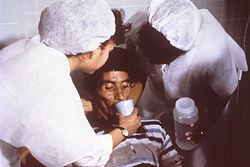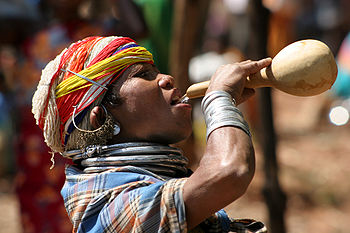- Drinking
-
Drinking is the act of consuming water or a beverage through the mouth. Water is required for many of life’s physiological processes. Both excessive and inadequate water intake are associated with health problems.
Contents
Physiology
- See also: Requirements (in Drinking water)
A daily intake of 3-6 liters of water[dubious ] is required for the normal physiological functioning of the human body, depending on ambient weather conditions and diet (especially salt and sugar intake). The absolute minimum over the long term is about 1.6 liters (600 ml for urine, 200 ml for fecal losses, and 800 ml for losses via the skin and lungs).[citation needed] This includes water contained in food (i.e., it is not essential to actually drink 1-2 liters of water a day for survival, though it is often recommended for good health).[citation needed]
The sensation caused by dehydration of the body is called thirst. The sensation of thirst is a dry feeling in the back of the throat and an intense desire to drink fluids. Thirst is regulated by the hypothalamus in response to subtle changes in the body's electrolyte levels, and also as a result of changes in the volume of blood circulating.
Many desert animals do not drink even if water becomes available, but rely on eating succulent plants.
Role in disease
 A cholera patient is drinking an oral rehydration solution in order to counteract his cholera-induced dehydration.
A cholera patient is drinking an oral rehydration solution in order to counteract his cholera-induced dehydration.
Polydipsia is the medical term for the desire to consume large quantities of water and may be a sign of various diseases (Diabetes Mellitus, Diabetes insipidus, and some psychiatric conditions).[citation needed]
Much of the world's disease is caused by the lack of clean drinking water. Lack of water in diet will eventually cause death by hypernatremia and dehydration, particularly when sweating consumes much of the body water. Unclean and unsanitary water can contain many bacteria and parasites that would otherwise be absent in clean water. Studies show that in some developing countries more than half of the population does not have access to safe drinking water.
It is also possible to overhydrate, which sometimes happens with athletes who consume too much water, thereby diluting the concentration of salts in the body. Overconsumption of water can be a sign of disease and/or mental health problems(e.g. damage to the hypothalamus), as stated above.
Fluid restriction
Fluid restriction or water restriction is where a person intentionally abstains from drinking water (or other beverage for hydration), either partially or completely.
Partial fluid restriction can be used in medicine, but have the disadvantages of being difficult to maintain, and it is often ineffective.[1] Drugs causing increased diuresis (diuretics) is generally an alternative, and have less risk of causing decreased glomerular filtration rate through the kidneys and resultant decreased kidney function. Fluid restriction is occasionally a practice in management of heart failure. However, according to a review in 2009, there is apparently no evidence of benefit of fluid restriction in patients with clinically stable heart failure otherwise receiving optimal pharmacological treatment.[2] Rather, diuretics are preferred in heart failure, mainly ACE inhibitors, with substantial evidence of improving survival and quality of life in heart failure patients.[3][4] Theoretically, fluid restriction could also correct the electrolyte imbalance in hyponatremia, but again, diuretics, mainly vasopressin receptor antagonists, show better efficiency.[1] Nevertheless, in hyponatremia secondary to SIADH, long-term fluid restriction (of 1,200–1,800 mL/day) in addition to diuretics is standard treatment.[5]
Also, fluid restriction is the test of choice to distinguish primary polydipsia from diabetes insipidus. In primary polydipsia, the urine osmolality should increase and stabilize at above 280 Osm/kg with fluid restriction, while a stabilization at a lower level indicatess diabetes insipidus.[6] Stabilization in this test means, more specifically, when the hourly increase in osmolality is less than 30 Osm/kg per hour for at least 3 hours.[6]
Fluid restriction can also be part of religious practice, such as being part of the fasting from dawn till dusk in the Ramadan period for Muslims. During the daylight hours of Ramadan fasting, practising Muslims are dehydrating, but it is not clear whether this is chronic during the month of Ramadan.[7] No detrimental effects on health have as yet been directly attributed to negative water balance at the levels that may be produced during Ramadan.[7]
Also, patients with terminal illness may refuse both nutrition and hydration.[8]
Alcoholic beverages
“Drinking” is often used metonymically as a synonym for the consumption of alcoholic beverages. Additionally, “having a thirst” or “being thirsty” can express a desire to drink alcohol.
See also
References
- ^ a b Gheorghiade, M.; Gottlieb, S.; Udelson, J.; Konstam, M.; Czerwiec, F.; Ouyang, J.; Orlandi, C.; Tolvaptan, I. (2006). "Vasopressin v(2) receptor blockade with tolvaptan versus fluid restriction in the treatment of hyponatremia". The American journal of cardiology 97 (7): 1064–1067. doi:10.1016/j.amjcard.2005.10.050. PMID 16563917.
- ^ Tai MK (October 2009). "Evidence-based practice of fluid restriction in patients with heart failure" (in Chinese). Hu Li Za Zhi 56 (5): 23–9. PMID 19760574.
- ^ The CONSENSUS Trial Study Group. (1987). "Effects of enalapril on mortality in severe congestive heart failure. Results of the Cooperative North Scandinavian Enalapril Survival Study (CONSENSUS).". N Engl J Med. 316 (23): 1429–35. doi:10.1056/NEJM198706043162301. PMID 2883575.
- ^ The SOLVD Investigators. (1991). "Effect of enalapril on survival in patients with reduced left ventricular ejection fractions and congestive heart failure.". N Engl J Med 325 (5): 293–302. doi:10.1056/NEJM199108013250501. PMID 2057034.
- ^ Schürer, L.; Wolf, S.; Lumenta, C. B. (2010). Water and Electrolyte Regulation. pp. 611. doi:10.1007/978-3-540-79565-0_40.
- ^ a b Elizabeth D Agabegi; Agabegi, Steven S. (2008). Step-Up to Medicine (Step-Up Series). Hagerstwon, MD: Lippincott Williams & Wilkins. ISBN 0-7817-7153-6.
- ^ a b Leiper, J.; Molla, A.; Molla, A. (2003). "Effects on health of fluid restriction during fasting in Ramadan". European journal of clinical nutrition 57 Suppl 2: S30–S38. doi:10.1038/sj.ejcn.1601899. PMID 14681711.
- ^ Patient Refusal of Nutrition and Hydration: Walking the Ever-Finer Line American Journal Hospice & Palliative Care, pp. 8-13, March/April 1995
External links
Categories:
Wikimedia Foundation. 2010.




